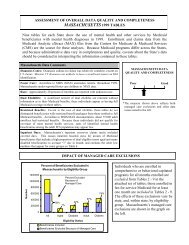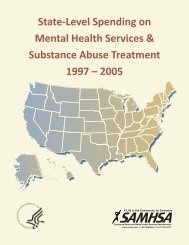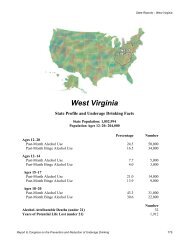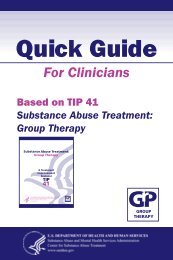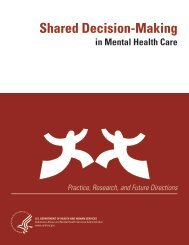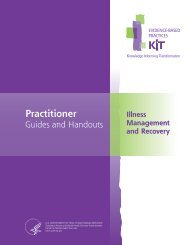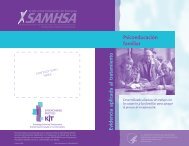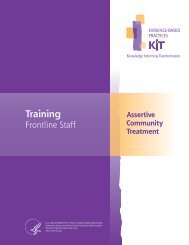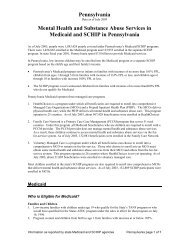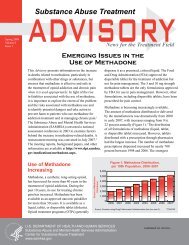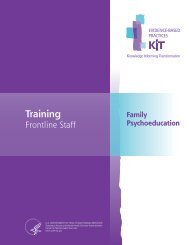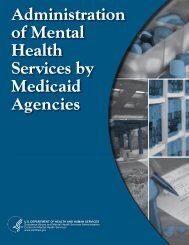Evaluation Findings - SAMHSA Store - Substance Abuse and Mental ...
Evaluation Findings - SAMHSA Store - Substance Abuse and Mental ...
Evaluation Findings - SAMHSA Store - Substance Abuse and Mental ...
You also want an ePaper? Increase the reach of your titles
YUMPU automatically turns print PDFs into web optimized ePapers that Google loves.
National <strong>Evaluation</strong> Study Components<br />
Treatment Effectiveness Studies<br />
Treatment effectiveness studies to examine evidence-based treatment implementation <strong>and</strong> outcomes<br />
in systems of care were implemented with three different treatments in six communities. Children<br />
received diagnostic assessments to screen for diagnoses treated by the evidence-based treatment;<br />
children accepted into the study were r<strong>and</strong>omly assigned to treatment <strong>and</strong> service as usual groups. A<br />
study of family education <strong>and</strong> support to build evidence for a practice utilized in systems of care is<br />
under way.<br />
The treatment effectiveness study of Parent–Child Interaction Therapy (PCIT) examined the<br />
effectiveness of an evidence-based treatment provided to a selected group of children with specific<br />
diagnoses served within systems of care funded in 1998. The goal of the study was to examine<br />
whether children who received an evidence-based treatment delivered in a system of care experienced<br />
better outcomes <strong>and</strong> maintained those outcomes longer than children in the same system who did not<br />
receive the evidence-based treatment.<br />
The study, initiated in 2001, began with a multi-stage process, including a treatment nominations<br />
process, a community selection <strong>and</strong> recruitment process, a treatment selection process, evaluation<br />
design, material development, <strong>and</strong> training. Two communities, the Bridges Project in Eastern Kentucky<br />
<strong>and</strong> the Clackamas County Partnership in Clackamas County, Oregon, participated in the study. Each<br />
community selected PCIT. The study design was tailored to meet the needs of each community, <strong>and</strong><br />
community-specific implementation <strong>and</strong> training materials were developed. Appropriate training<br />
workshops were presented to providers in the PCIT <strong>and</strong> non-PCIT conditions, <strong>and</strong> services were<br />
initiated in 2003.<br />
In the Oregon site, approximately 55 percent of the treatment group (n = 36) reported a decrease in<br />
caregiver strain from baseline to 18 months when compared to 34 percent of the control group (n = 41)<br />
( 2 = 6.1, p < 0.05), according to caregiver report using the Caregiver Strain Questionnaire. About 14<br />
percent (n = 28) of the treatment group ( 2 = 4.898, p < 0.05) improved on the child competence<br />
subscale of the Child Behavior Checklist from baseline to 18 months, while none of the children from<br />
the control group (n = 32) improved. In the Kentucky site, about half of the children from the treatment<br />
group (n = 16) gained strengths over the 18 months when compared to 38 percent of the control group<br />
children (n = 29) ( 2 = 6.675, p < 0.05), according to caregiver report using the Behavioral <strong>and</strong><br />
Emotional Rating Scale.<br />
Special Studies<br />
Treatment Effectiveness Study examines the effectiveness of a specific evidence-based treatment<br />
provided to selected groups of children/youth with specific diagnoses served within CMHS-funded<br />
systems of care.<br />
Evidence-Based Practices Study examines the effects of various factors on the implementation of<br />
evidence-based practices in systems of care.<br />
Family Education <strong>and</strong> Support Study examines the critical elements of family education <strong>and</strong> support<br />
services in systems of care, their effectiveness across communities, <strong>and</strong> their impact on child/youth<br />
<strong>and</strong> family outcomes.<br />
Primary Care Provider Study investigates the role of primary health care providers in systems of care<br />
<strong>and</strong> factors that facilitate <strong>and</strong> interfere with interaction between primary care providers <strong>and</strong> mental<br />
health providers.<br />
Culturally <strong>and</strong> Linguistically Competent Practices Studies assess system of care service providers‘<br />
level of competence across several domains of cultural competence, including the role that<br />
organizations <strong>and</strong> agencies play in hindering or facilitating culturally competent service provision.<br />
Tribal Financing Study examines the unique financing opportunities <strong>and</strong> challenges experienced by<br />
American Indian <strong>and</strong> Alaska Native systems of care.<br />
The Comprehensive Community <strong>Mental</strong> Health Services for Children <strong>and</strong> Their Families Program <strong>Evaluation</strong> <strong>Findings</strong><br />
2006–2008 Annual Report to Congress ● Appendix D ● Page 4



